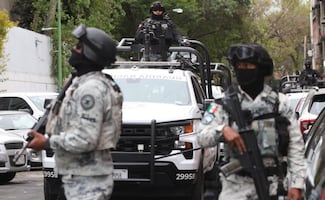Más Información

Violencia en Jalisco tras muerte de "El Mencho" deja 25 detenidos; saquean 69 tiendas Oxxo y dañan 18 sucursales del Banco del Bienestar

"El Mencho", una década bajo acecho en México; el líder del CJNG fue localizado en cinco ocasiones y logró huir

Sheinbaum llama a la calma tras bloqueos por muerte de "El Mencho"; destaca coordinación con los estados
Amid pressure from Washington, Mexico is backpedaling on promises of better treatment for Central American migrants , leaving hundreds stranded in unsanitary camps near its southern border and allegations of irregular detentions.
Mexican President Andrés Manuel López Obrador
promised more humane treatment for Central American migrants when he took office in December. His left-leaning government issued thousands of year-long humanitarian visas in January, giving migrants legal access to jobs and the right to travel to the United States.
However, caught off guard by a surge in arrivals, Lopez Obrador’s administration is resorting to old tactics based on tough law enforcement .
Mexico has halted the liberal visa policy and ramped up detentions of migrants heading North , government data shows, following criticism from U.S. President Donald Trump of a jump in the number of Central American asylum seekers reaching the U.S. border in February.
Trump, who is expected to make border security central to his 2020 re-election bid, has vowed to limit trade with Mexico if it does not help slow immigration .
While Lopez Obrador’s government has said it will not react to “threats”, sources familiar with Mexican policy, who asked not to be identified, said near-daily U.S. government pressure had led the interior and foreign ministries to push the National Migration Institute ( INM ) for tougher action.
The White House did not immediately respond to a request for comment.
Unreleased INM data showed that it detained 12,746 undocumented migrants for registration in March , up by nearly one-third from February and two-thirds from January.
The agency also stopped processing new applications for humanitarian visas on January 28 , after issuing some 13,000—mostly to Central Americans arriving that month in the southern border state of Chiapas , the site of most migrant arrivals.
A few thousand more visas were issued in February, but none since said an INM official in Mexico City , who was not officially authorized to speak to the media and asked to remain anonymous.
INM said in a statement earlier this month it remained open to i ssuing humanitarian visas in Chiapas, with priority given to women , children , and the elderly.
In Chiapas , the INM’s decision to close its main office in the border city of Tapachula a month ago has forced hundreds of migrants to travel 65 miles (105 km) North to the smaller town of Mapastepec , where they have languished in sweltering temperatures, hoping for humanitarian visas.
Hundreds of bedraggled men, women, and children have been sheltering for nearly three weeks inside the stadium , as migration officials registered their identities while neglecting the group camped over the road, rights groups, and migrants said.
Without water, medical help or government attention, migrants are dependent on scant handouts from locals .
A coalition of over a dozen human rights and humanitarian aid groups operating in Chiapas has called the buildup of stranded migrants a “humanitarian crisis ,” and said the confusion over visas was worsening the plight of migrants.
I NM Commissioner Tonatiuh Guillén López said in a recent interview his agency was taking a “ stricter ” approach in southern Mexico because of the influx of migrants in Chiapas . However, he denied that was a response to U.S. pressure and said Mexico was pressing ahead with more humane migration policies.
INM officials said they closed the main regional office in Tapachula on March 15 after Cuban migrants stormed the premises, enraged that they were not seeing faster results.
Rights groups and migrants, however, dispute this.
Nonetheless, the closure has created a bottleneck of visa applicants , hundreds of whom headed north to Mapastepec.
On Saturday, INM suddenly halted registration at the stadium in Mapastepec and said migrants would have to wait at least a month longer.
INM said work had been stopped after some migrants had caused a disturbance requiring police to intervene and registration would continue at another site, without providing details.
On Wednesday, the INM said it would not issue any humanitarian visas in Mapastepec , but migrants would instead be able to request a seven-day permit to visit Mexico’s southern border states, which would not allow them to journey northward.
It also said migrants would be notified of that once an evaluation of the registrants was completed.
Despite the uncertainty, many migrants preferred to wait to request legal status before continuing their journey in caravans . Migrants who travel alone and without papers in Mexico are frequent prey for kidnappers and smugglers , in addition to risking detention or extortion by police .
In an effort to stem the build-up of migrants in Chiapas , INM said this month that citizens of El Salvador , Honduras , and Guatemala will be able to register for the visas through Mexican consulates in their home countries from late May.
sg
Noticias según tus intereses
[Publicidad]
[Publicidad]















